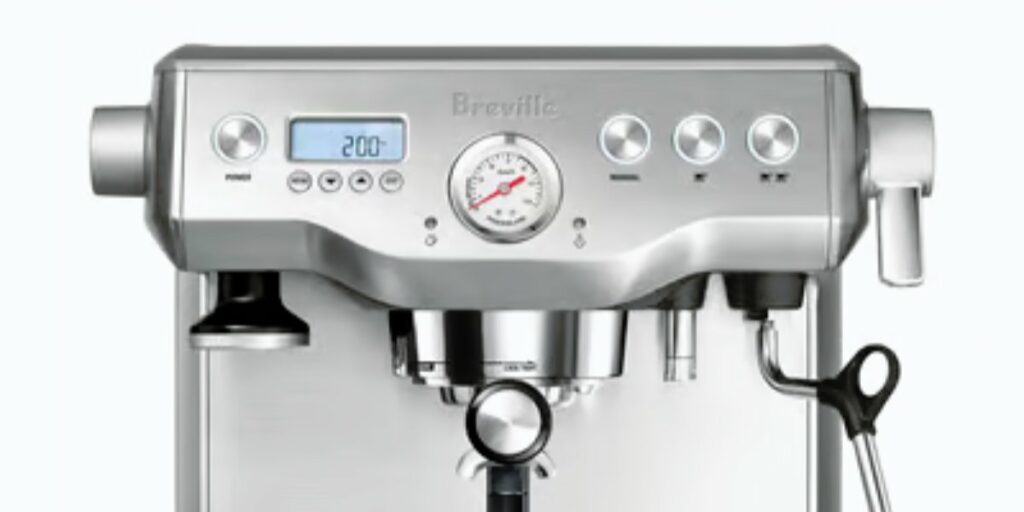Keeping your Breville Espresso Machine clean is not just about maintaining hygiene; it’s about ensuring the longevity of the machine and the quality of the coffee it brews. A well-maintained espresso machine is the secret behind those perfect cups of coffee that start your mornings or complete your evenings. Cleaning your espresso machine might seem daunting, but with this guide, you’ll find it’s simpler than you think.
Follow these steps to ensure your coffee machine serves delicious, aromatic coffee.
1. Cleaning the Group Head
The group head is where the magic happens, and it’s crucial to keep it clean. Start by removing any coffee grounds from the portafilter. Next, use a damp cloth to wipe down the group head. Many Breville machines come with a cleaning tool specifically designed for this purpose. If yours did, use it to scrub the group head gently. This will remove coffee oils and residues that, if left unchecked, can affect the taste of your coffee.

2. Cleaning the Filter
Your espresso machine’s filter needs regular attention to prevent clogging and ensure a smooth coffee flow. Remove the filter from the portafilter and rinse it under hot water. Use a soft brush or a pin to clear the holes of any stuck coffee particles. Soak the filter in a mixture of water and a little detergent for a deeper clean, then rinse thoroughly.
3. Replacing the Water Filter
The water filter in your Breville Espresso Machine is vital in preventing scale buildup and ensuring your coffee tastes great. Depending on your water hardness and how frequently you use your machine, you should replace the water filter every two to three months. Simply remove the old filter, soak the new filter in water for about five minutes, and insert it into the machine. Remember to reset the water filter indicator on your machine if it has one.
4. Cleaning the Grinder
If your Breville machine has a built-in grinder, keeping it clean is essential for fresh-tasting coffee. Unplug the machine and remove the hopper. Use a brush to remove leftover coffee grounds and clean the area around the burrs without using water. For a thorough cleaning, consult your machine’s manual on how to safely remove the burrs and clean them.
5. Using the Cleaning Disk & Tablets
Breville machines typically have a cleaning disk and tablets to clean the machine’s internal parts. Insert the cleaning disk into the portafilter and add a cleaning tablet. Attach the portafilter to the group head, select the cleaning cycle, and start the machine. This process will remove any built-up coffee oils and residues from the machine’s internal parts.
6. Running a Cleaning Cycle
Most Breville Espresso Coffee Machines have a cleaning cycle feature. Fill the water tank with fresh water, and if your machine uses cleaning tablets, insert one into the portafilter with the cleaning disk. Start the cleaning cycle as per your machine’s instructions. This process usually takes about five minutes and ensures that the machine’s internal parts are thoroughly cleaned.
7. Running a Brew Cycle with Water Only
After completing the cleaning cycle, run a brew cycle with water only, no coffee. This helps rinse any remaining cleaning solution and ensures that your next cup of coffee is free from unwanted tastes. Fill the water tank, place a cup under the group head, and run the machine as if brewing a shot of espresso. Repeat this process a few times until the water runs clear.
Regular Maintenance for Best Performance
Cleaning your Breville Espresso Machine is not just a one-time task but a regular part of its maintenance. Following the steps outlined above will not only prolong the life of your coffee machine but also enhance your coffee experience. Always refer to your machine’s manual for specific instructions, especially when disassembling parts for cleaning.
How often should you clean descale a Breville espresso machine?
Knowing when your espresso machine needs descaling is key to maintaining its performance and ensuring the quality of your coffee. Here are signs that indicate it’s time to descale your machine:
- Slower Brewing Time: If your espresso machine takes longer than usual to brew a cup, this could be a sign that mineral deposits have built up, restricting water flow.
- Reduced Steam Power: A noticeable decrease in the steam pressure or the machine’s ability to froth milk efficiently can indicate scale buildup within the steam wand or the machine’s internal parts.
- Change in Coffee Taste: If your coffee starts tasting off, bitter, or different from usual, it might be due to mineral buildup affecting the water’s flow and temperature.
- Visible Mineral Deposits: Sometimes, mineral buildup can be seen around the water tank, on the machine’s parts, or in areas where water is frequently heated or evaporated.
- Machine Alerts: Many modern espresso machines, including Breville ones, have indicators or alert systems that notify you when it’s time to descale. If your coffee machine has this feature, it will take the guesswork out of knowing when to descale.
- Frequent Use or Hard Water: If you use your espresso machine frequently or have hard water, you may need to descale it more often. Sticking to a regular descaling schedule based on usage and water hardness is a good practice, even without visible signs.
If you observe any of these signs, it’s advisable to describe your espresso machine promptly to prevent further buildup and potential damage. Always use the manufacturer-recommended descaling solution and follow the descaling process as outlined in your machine’s manual to ensure effective cleaning and maintain the machine’s longevity.
How often should you clean descale a Breville espresso machine?
The frequency at which you should descale a Breville espresso machine depends on several factors, including the hardness of your water and how often you use the machine. Generally, Breville recommends descaling every 2 to 3 months. However, suppose you live in an area with hard water (high mineral content). In that case, you might need to descale more frequently to prevent scale buildup, which can affect the machine’s performance and the taste of your coffee.
Breville espresso machines often come with a water hardness test strip that allows you to test the mineral content of your water. After determining your water’s hardness, you can adjust the machine’s descaling alert to match your specific needs, ensuring that you descale at the optimal frequency for your water type.
It’s also a good idea to refer to your specific Breville espresso machine’s manual for the manufacturer’s recommendations on descaling frequency. Following the recommended schedule and using the appropriate descaling solution will help maintain your machine’s performance and longevity.
Can I use vinegar to descale my Breville espresso machine?
The manufacturer generally does not recommend using vinegar to descale the espresso machine. Breville advises against using vinegar for descaling because the acetic acid in vinegar can be harsh on the machine’s internal components and rubber seals, potentially causing damage over time. Instead, Breville recommends using a proprietary descaling solution designed for its machines.
The descaling solution formulated for Breville espresso machines is created to remove mineral buildup effectively without harming the machine. It’s important to follow the manufacturer’s instructions for descaling, which typically involve using the recommended descaling solution according to the specific guidelines in your machine’s manual.
Suppose you’re concerned about scale buildup and want to ensure your machine operates smoothly. In that case, it’s best to use the descaling solution Breville recommends. Additionally, using the proper descaling solution helps maintain the machine’s warranty, as using non-recommended products could potentially void it.
For best results and to keep your machine in top condition, adhere to Breville’s cleaning and maintenance schedule, using only approved products and methods.
Remember, the effort you put into cleaning and maintaining your espresso machine is directly proportional to the coffee’s quality. A clean machine is the foundation of a perfect espresso, ensuring that each cup is as delicious as the last. So, take the time to care for your Breville Espresso Machine, which will always reward you with exceptional coffee.

